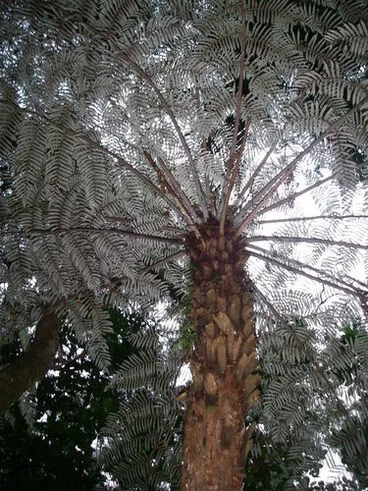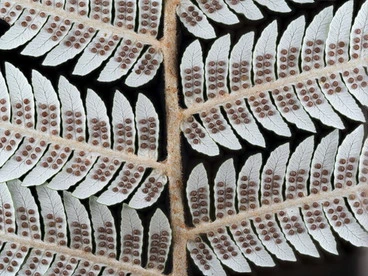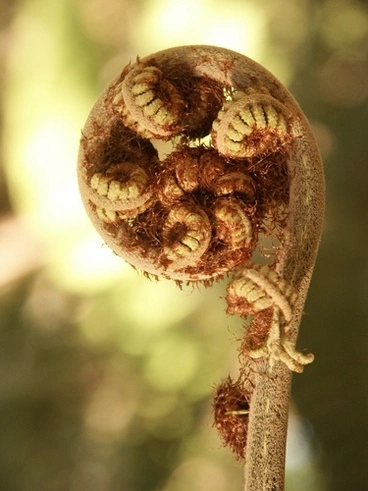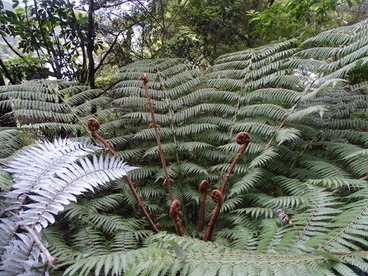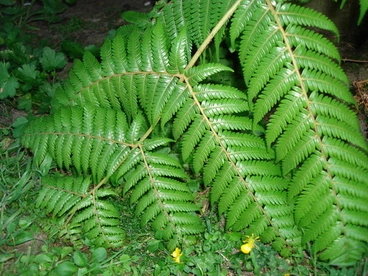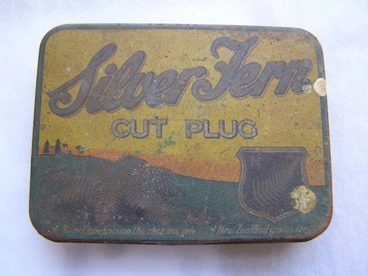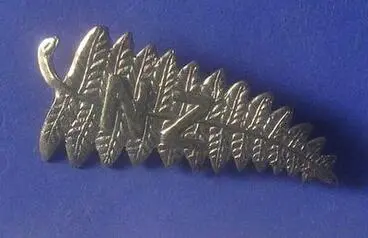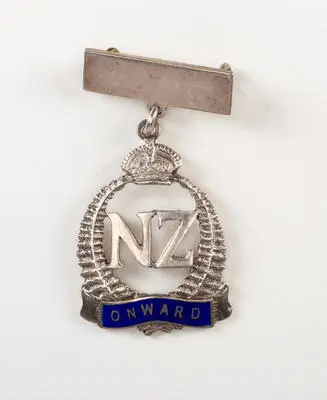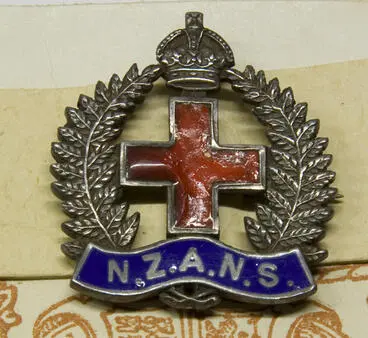Silver fern: Tuia Mātauranga Curiosity Card
A DigitalNZ Story by National Library Services to Schools
This silver fern (Cyathea dealbata) specimen was collected from Aotearoa New Zealand in 1769 by Joseph Banks and Daniel Solander.
Silver fern, Cyathea dealbata (G.Forst.) Sw.
Museum of New Zealand Te Papa Tongarewa
WHAKATAUKĪ
"Mate atu he tētēkura, ara mai he tētēkura."
"When one fern dies, another emerges."
silver fern
iNaturalist NZ — Mātaki Taiao
silver fern
iNaturalist NZ — Mātaki Taiao
silver fern
iNaturalist NZ — Mātaki Taiao
BACKGROUND
Ferns
Mature ponga or silver ferns (Cyathea dealbata) can be recognised by the silver-white undersides of their fronds (below). These ferns grow to about 10 metres high, and are found throughout lowland forest and secondary scrub in the North Island and drier regions of the South Island.
Source: 'Ferns and lycophytes — Ferns and lycophytes in New Zealand', URL: http://www.teara.govt.nz/en/photograph/10881/silver-fern, (Ministry for Culture and Heritage), (published 24 September 2007)
The silver fern emblem
The silver fern (a species of tree fern, Cyathea dealbata) has been an important, though unofficial, national emblem since it was first worn by players in the 1888 New Zealand Natives rugby team which toured Britain. It has been used mostly as a badge by representative sporting teams and on military uniforms and graves, but also became a trademark for meat and dairy exports.
Source: 'Nation and government — Nationhood and identity', URL: http://www.teara.govt.nz/en/photograph/2579/wearing-the-silver-fern, (Ministry for Culture and Heritage), (updated 16 September 2016)
Te whakamau i te koru
Ahakoa kāore tōna mana ā-ture, mai anō i tōna mautanga tuatahi e te kapa whutupaoro Māori ki Peretānia i te tau 1888, he tohu whakahirahira te koru nō Aotearoa. I te nuinga o te wā, ka whakamahia tēnei tohu ki runga i ngā kākahu o ngā kapa hākinakina, ki runga hoki i ngā kākahu me ngā urupā o ngā ope taua. He waitohu anō tēnei e whakamahia ana ki roto i ngā mahi hoko ki tai mō te mīti me ngā hua miraka.
Source: 'Tuakiri o Aotearoa me te kāwanatanga — Te tuakiri o Aotearoa', URL: http://www.teara.govt.nz/mi/photograph/2579/te-whakamau-i-te-koru, (Ministry for Culture and Heritage), (updated 16 September 2016)
silver fern
iNaturalist NZ — Mātaki Taiao
Silver Fern
iNaturalist NZ — Mātaki Taiao
QUICK FACTS
- Silver fern fronds were used as a guide by Māori when travelling through the bush at night. The white underside, when turned up, reflects moonlight.
- In 1893, Tom Ellison was the first to suggest that the New Zealand rugby team adopt a black jersey with a silver fern.
- The silver fern can grow up to 10 metres high.
- Silver ferns do not develop their distinctive white/silver underside colouring until they are a few years old.
- New Zealand ferns are often referred to as ponga or punga. New Zealand has around 200 species of native ferns.
- Some parts of our native ferns were used as medicine by Māori and Pākehā. One that was sold was labelled Mrs Subritzky’s Ponga powder for fever and inflammation.
- The trunks of the silver fern were used by settlers and bushmen for fences, chimneys and even making roads.
- The leaves of ferns are called fronds.
- Ferns don’t have fruit, seeds or flowers. They reproduce from spores that grow on the underside of the fronds.
"Silver Fern" Tobacco Tin.
Howick Historical Village
‘Ferns’ by Neil Dawson
Manatū Taonga, the Ministry for Culture and Heritage
brooch, silver fern
Auckland War Memorial Museum Tāmaki Paenga Hira
Wearing the silver fern
Manatū Taonga, the Ministry for Culture and Heritage
Fernleaf New Zealand butter; a pure natural food. [Display card. 1950s?]
Alexander Turnbull Library
Table centrepiece, in the form of a Mamaku (tree fern)
Museum of New Zealand Te Papa Tongarewa
Team logo
Manatū Taonga, the Ministry for Culture and Heritage
John Key wearing Silver Fern flag pin
Manatū Taonga, the Ministry for Culture and Heritage
Whitehead, Boy
Puke Ariki
OTHER RESOURCES
Captain Cook’s silver ferns — Silver ferns collected on Cook’s first voyage to New Zealand tell stories of science and exploration.
New Zealand icon: Silver fern — the silver fern (Cyathea dealbata) has come to embody the spirit of New Zealand.
New Zealand icon — Silver fern — kua tipu te ponga hei tohu i whakatinana i te wairua o Aotearoa.
Our national symbol — there is no denying the silver fern (Cyathea dealbata) is one of our nation’s most recognised national symbols but what is less recognised is its story of origin, its whakapapa kōrero.
Silver fern — Cyathea dealbata is a species of medium-sized tree fern, endemic to New Zealand. The word 'dealbatus' in the species name is from the Latin dealbatus (covered with white powder), a reference to the distinctive white undersides of the fronds.
Why is the silver fern New Zealand's symbol — ko te ponga he tohu mō Aotearoa, he aha ai?
Te Papa Atawhai — Silver Fern — ko te pae tukutuku o Te Papa Atawhai.
The significance of the silver fern — the ‘silver fern’ (Cyathea dealbata) — ponga in te reo Māori — is a species of tree fern only found in New Zealand.
N.Z.I.B.D. Sports. A fine athlete . A gunner of the N.Z.F.A. who won 6 events and was 3rd in the 7th. He won 300, 120, hurdles, 220, High jump and ...
Auckland War Memorial Museum Tāmaki Paenga Hira
Flags during the Rugby World Cup 2011
Manatū Taonga, the Ministry for Culture and Heritage
[Silver Fern]
Alexander Turnbull Library
FERTILE QUESTIONS
- Why do people collect specimens?
- How and why are plants valuable?
- He aha e whakarangatirahia ai ngā tipu?
- What are symbols and why do we use them?
- What would be important enough for you to want to save?
- E ai ki ngā ritenga Māori, āta whakamahia ai ngā tipu me ngā rākau ki te aha?
- What is your question?
brooch, sweetheart
Auckland War Memorial Museum Tāmaki Paenga Hira
Badge, New Zealand Army Nursing Service
Puke Ariki
Tobacconist Shop window display
Alexander Turnbull Library
ADDITIONAL QUESTIONS
- How does a natural thing become a symbol?
- What can we do to protect the biodiversity and sustain a healthy economy at the same time?
- What special features do plants create/adapt and why?
Gordon Walters, 'Painting no. 1'
Manatū Taonga, the Ministry for Culture and Heritage
Untitled [fern photogram]
Museum of New Zealand Te Papa Tongarewa
This story was curated and compiled by Te Puna Mātauranga o Aotearoa | National Library of New Zealand, Services to Schools staff, 2019.
